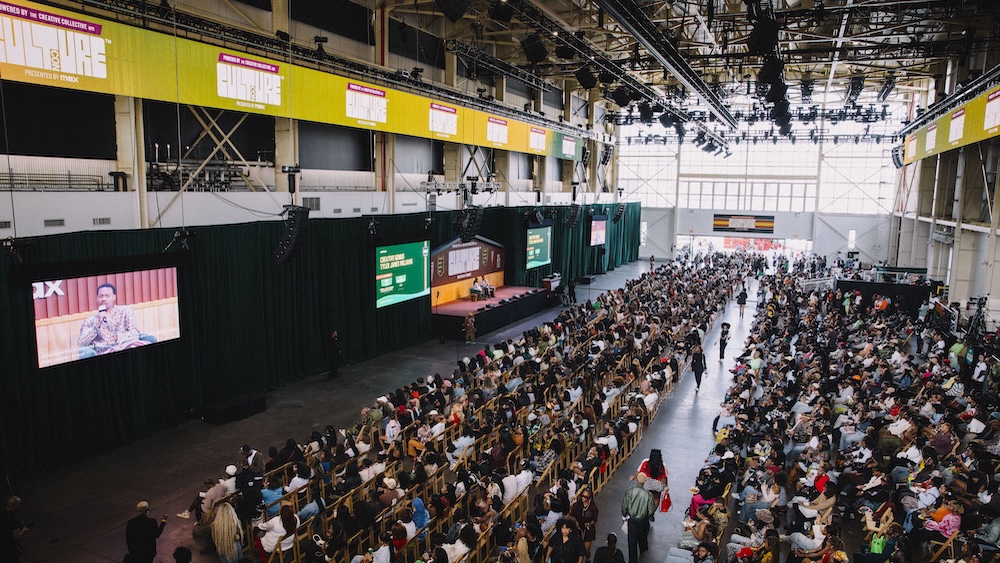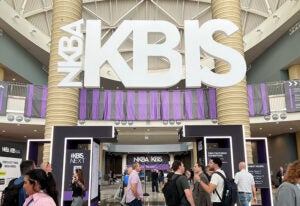


CultureCon ’24 took place at the Duggal Greenhouse located in the Brooklyn Navy Yard. Photo courtesy Noemie-Marguerite Photography.
In 2016, Imani Ellis was working in communications for NBCUniversal in New York when she started a small gathering of other Black creatives in her one-bedroom Harlem apartment, bringing them together to support one another and share resources. She wasn’t trying to start something, Ellis told radio station WBLS in 2022, she was trying to stop something. “I was going to different conferences and networking events,” Ellis said, “and it didn’t really feel like they were curated for creatives of color.”
The living room group grew into the Creative Collective NYC, and the next year, Ellis launched CultureCon, a gathering that she’s described as “an ideas conference that prioritizes connection and vulnerability.” The inaugural CultureCon, which was held in Brooklyn, attracted 150 attendees. CultureCon ’24, also in Brooklyn, drew 10,000 participants and the Creative Collective community has grown to 100,000 people in 133 countries.
At 3:15 this afternoon, Ellis will be joined by Kelly Ricker, COO of the Global Technology Industry Association (GTIA), for a fireside chat. Convene spoke with Ellis before edUcon about how she has balanced such rapid growth while maintaining a sense of connection, among other topics.
One of CultureCon’s taglines is “Big Things Start Small.” Could you talk a little bit more about how CultureCon grew out of the Creative Collective community?
CultureCon was such a natural evolution of the needs of the collective. We were meeting in smaller groups, and what we saw was that there was so much information and inspiration happening that we wanted to take that feeling and bottle it up into the conference space. That was the beginning of CultureCon — bringing a lot of these individual events together. The mission was steeped in accessibility and democratizing education and entrepreneurship.
How do you balance the smallness and richness of that experience — the genuine nature of connections and the ability to create strong relationships — as your community and conference grows?
We like to call it scaling intimacy, and what that means is exactly what you just said. It’s taking the intimacy of what it feels like when you walk into a party and someone smiles at you and invites you over, and you’re able to really enjoy that time together. What does that look like at a conference space? And so for us, it’s really been about being really intentional with the entire design of the event.
We are thinking about the consumer before their experience, before they even get there. We’re giving them tools and advice on even the mindset to bring when you’re going into a room of 10,000 people. It can be very intimidating, but what if we told you that these are already your friends, you just haven’t met them yet? A lot of the curation of what makes the room feel so special are all these intimate touches that lead up to — and then happen during — the event.
What advice would you give community builders about the relationship between in-person and online interaction?
I think the advice I would give to anyone who’s building community online or digitally is to spend a lot of time literally in community. I think sometimes the pressure can become a little bit of a guessing game — I don’t know what the community wants. But the best way is to ask, and that’s in person and that’s IRL.
Imani Ellis
We do a lot of social listening on digital channels, which means we’re looking for what our community is saying in the comments, we’re looking for what they’re saying on their own pages. That’s informing how they’re feeling, which is really, really important data for when you’re building and showing up digitally — you can’t just show up with what you think people want. You really want to respond to what they’re asking for.
And then in person, it’s really the same way. It’s creating these open formats that can be anything from traditional focus groups or surveys to just — I love to walk around CultureCon. I walk around the other attendees and just stand next to a person. And they’re like: “Wait, you’re the founder.” And I’m like, “Yeah, do you want to grab something to eat?” I really like to be among the people because communities are living, breathing, ever-changing systems — maybe what worked two years ago might feel really stale two years later.
There is something about just carving out time for research and development. I think a lot of times what happens is we rush to have the output, but the research and the development is what makes the output so special.
I’ve seen some research about the craving among younger people for in-person events — going to vinyl-record rooms where they check their phones at the door and just have the space be in-person. Does that resonate with you and your community? Have you seen any similar uptick in people wanting to be together in person?
Yes, I think the best thing about humanity is how cyclical we are. We crave community, we’re built for community, right? And so I think that this uptick that we’re seeing is kind of in response to the huge kind of prioritization of “we can do everything through technology.”
The Creative Collective was born out of a need for togetherness and community. And so it really does excite me when I see gen Gen Z. There’s a trend, like you said, of the record rooms where they’re leaving their phones at the door. There’s an uptick of board game clubs and reading clubs and running clubs. My mom chuckles, because these are all things that she was doing when she was in college — she was a part of a knitting club. I think it’s what keeps us human — getting back to being together, inspiring each other. And come to find out, it doesn’t always have to be a super-complex event that brings you joy. It really can just be being in the presence of people who see you and celebrate you.
I wanted to ask you about your background in strategic communications in the entertainment industry. What advice would you give that you think other people who don’t have that background might want to hear or benefit from?
That’s a great question. I think I’m very empathetic and very open to other ideas. Working in communication, you really have to understand that there’s just so many ways that people view things. And based on what motivates them and how they view things is how they’re going to see the world. It’s how they’re going to show up. And so I think one thing that people can take from what I’ve learned in communications is that you want to open yourself up to a lot of perspectives. If everyone on your team and everyone in your community agrees with everything that you say, that might feel convenient in the moment, but it’s not a true representation of collaboration. There needs to be different thoughts and different opinions for there to be progress.
And sometimes when you’re building something and people have different ideas, it can feel very personal. But I think if you can reframe it and see it as these are all parts of the dialogue — so many ideas at CultureCon have come from people just giving suggestions. And I love that, because it’s not ImaniCon, right? It’s a community of people and ideas, and I think that’s what makes it so strong.
Your community was created for Black creatives, as a place for them to come together, and I’ve read that it’s not meant to be limited to people who identify as Black creatives. Could you talk a little bit about what inclusivity means to you and in your events?
I think for me, what I really recognized is that — and this is not an original quote — but it’s a quote that I really, really love, which is that even though talent is distributed equally, access is not. And one of the things that we really want to prioritize at the Creative Collective is just making sure that no one in the creative industry is getting left behind.
We live in a time where some of these words that are not bad words are being made to be bad words. But I think that what I love most about this country is that there are so many voices that contribute to what make this country great. And so at the Creative Collective — listen, we love our allies and everyone is invited, but who we’re centering on are going to be those diverse voices. And, we have so many incredible allies who understand the importance of championing creativity. I think once we’re able to really kind of lean into it not being an “either/or” but a “both/and,” I think that’s when we’re going to see real, real progress.
Barbara Palmer is deputy editor at Convene.







